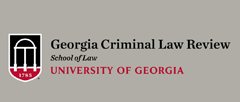Georgia Criminal Law Review
Document Type
Notes
Abstract
Driving Under the Influence of Drugs (DUID) cases pose unique challenges to the criminal justice system. An evidentiary chemical test is a vital piece of evidence in a DUID prosecution because unlike alcohol, drugs do not cause impairment in a uniform fashion. Breath tests cannot detect drugs, and the intrusiveness of blood and urine tests has been the focus of Court cases over the past half-century with decisions in Missouri v. McNeely and Birchfield v. North Dakota curtailing the government’s ability to obtain this evidence without a warrant.
The need for a less intrusive alternative is driven by the doubling of DUID cases in some jurisdictions, by marijuana now being legal in forty states, and by the almost fifty million Americans who used marijuana in the last year. Marijuana is detected in half of all DUID cases, and drivers in serious injury or fatal collisions are now more likely to be under the influence of marijuana than alcohol.
Oral fluid tests, such as buccal swabs, have been praised by scientists and law enforcement as a reliable and less intrusive option to obtain warrantless evidentiary samples for DUID. For over fifty years scientific studies have shown the method is reliable. Roadside programs have echoed this for over fifteen years, and the method has been accepted by American courts in other cases for almost a century. Even so, oral fluid was not introduced as evidence in a DUID case until 2015 in People v. Salas. Salas remained the only case to have done so until Alabama began utilizing the technology for evidentiary purposes in 2018.
The future of oral fluid samples as a viable means to test for the presence of drugs in DUID cases is still uncertain as there has yet to be a single case to have been appealed. With the increasing number of DUID cases, the rising number of Americans using marijuana, and with more states beginning programs to use oral fluid, the stage is set for an issue of first impression: Will oral fluid samples survive evidentiary and constitutional challenges and be recognized as a reliable piece of evidence in DUID cases?
Recommended Citation
Wise, Ian
(2024)
"The Use of Oral Fluid Samples to Test for Driving Under the Influence of Marijuana,"
Georgia Criminal Law Review: Vol. 2:
No.
1, Article 4.
Available at:
https://digitalcommons.law.uga.edu/gclr/vol2/iss1/4

